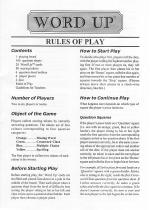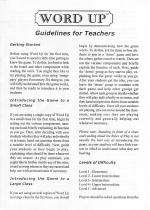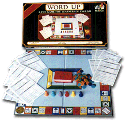|
|
|||
|
|
|---|
| Rules of Play |
Contents 
1 playing board (click to view) Number of players Two to six players or teams. Object of the gamePlayers collect scoring tokens by correctly answering questions. The tokens are of four colours corresponding to four question categories: Orange. . . . . Missing WordThe first player to collect two tokens of each colour is the winner. Before starting play Before starting play, the Word Up cards are shuffled and placed face-down in a pile in the middle of the board. Then each player takes a question sheet from the level of difficulty best suiting the player sitting to his or her left and clips it face-up to a question sheet holder. Each player then chooses a player piece. How to start playTo decide who plays first, players roll the dice, with the player rolling the highest number playing first. If two or more players tie, they roll again. The first player then places his or her piece on the Bonus square, rolls the dice once more, and then moves his or her piece that number of squares from the Bonus square towards the Stop square. (Players always move their pieces in a clockwise direction, like this.) How to continue playWhat happens next depends on which type of square the player's piece lands on: 'Question' SquaresIf the player's piece lands on a Question square (i.e. one with an orange, green, blue or yellow border), the player sitting to his or her right reads the first question from the corresponding category on his or her question sheet. If the first player answers correctly, he or she earns a scoring token of the appropriate colour and another roll of the dice. If the player does not answer correctly, no token is taken and the next player to the left places his or her piece on the Bonus square and rolls the dice to begin his or her turn. For example, if 'Carlos' plays first and lands on a Question square with a green border, 'Maria', who is sitting to his right, reads the first Crossword Clues question from her question sheet. If Carlos answers correctly, he takes a green token and rolls the dice again to continue. If he doesn't answer correctly, his turn is over and the next player to his left begins his or her turn. Other squares players may land on are: 'Word Up' SquaresPlayers landing on one of the red Word Up squares take the top Word Up card, follow the instructions, and then return the card to the bottom of the pile. 'Option' SquaresPlayers landing on an Option square (i.e. a square bordered by two colours) may answer a question from either of the categories represented by the two colours. If they answer correctly, they earn a scoring token of the appropriate colour and another roll of the dice. Otherwise, they stop. (There are four Option squares, one in the middle of each side of the board.) For example, if Carlos lands on the Option square bordered by green and blue, he may answer either a Crossword Clues question (green) or a Multiple Choice question (blue). If he chooses Multiple Choice, Maria reads him the next Multiple Choice question from her question sheet. If Carlos answers correctly, he takes a blue token and rolls the dice again to continue. If he doesn't answer correctly, he stops and the next player to his left begins his or her turn. 'Stop' SquarePlayers must stop and wait until their next turn to continue. 'Big Chance' SquarePlayers have the chance to earn two tokens by correctly answering a question from whichever category they choose. For example, if Carlos lands on this square and chooses 'Spelling', Maria reads him the next Spelling question on her question sheet. If Carlos answers correctly, he takes two yellow tokens and continues. Otherwise, he stops. 'Keep Out!' SquarePlayers lose two tokens and stop. If they have only one token, they lose that token. If they have more than two tokens, they may choose which tokens to lose. The 'Bonus' SquarePlayers take two free tokens and continue. The tokens they choose must be of different colours. How to winThe first player to collect two scoring tokens of each colour is the winner. Note: If a player collects the last token needed to win by receiving it free, or by exchanging it for another token, he or she must correctly answer a question from the corresponding category in order to keep the token and win the game.Levels of DifficultyThe question sheets are divided into five levels of difficulty: Level 1 - Elementary Before play begins, each player takes a question sheet from the level of difficulty best suiting the player sitting to his or her left. The level best suiting a player is the one at which he or she can answer around half the questions correctly. Asking QuestionsAll the questions should be read aloud. If the player reading a question is not sure how to pronounce one or more words, he or she may ask another player, or the teacher, to help out. Players should ask questions in the order in which they appear on the question sheets. If a player has already asked all seven questions for a particular category and must ask another, he or she should take another question sheet from the same level of difficulty and ask the first question from the appropriate category. The player answering a question may ask for it to be repeated, or may ask for one or more words to be spelt. (This includes any word in a Spelling questions except, of course, the target word.) The player answering may not, however, be allowed to look at the question. After an answer has been given, the player reading the question states whether it is correct or not. If it is not correct, this player then reads the correct answer(s). (The answers and the Spelling questions are found on the back of each question sheet.) Note: The rules do not stipulate how long a player may take to answer a question. Players should decide among themselves what constitutes a reasonable length of time. The Question CategoriesMissing Word (Orange)The player asking the question reads the sentence, making an 'mmm' sound or saying 'dot dot dot' to indicate where the missing word is located, and then states the number of letters the missing word contains. Often there are several words that could correctly be used in the space. Only one correct word is required to earn a token. Giving two correct words does not earn two tokens. Crossword Clues (Green)The player asking the question reads the clue and then gives the first letter of the correct answer. Again, only one correct word is required to earn a token, and giving two correct words does not earn two tokens. Multiple Choice (Blue)The player asking the question reads the question plus the three alternative answers. The player answering repeats the correct alternative to earn a token. Spelling (Yellow)The player asking the question reads the sentence and then repeats the word printed in bold type. If the player answering spells this word correctly on the first attempt, a token is earned. If the spelling is incorrect, the player asking the question should give the correct spelling. Players do not need to specify capital letters or hyphens to earn a token. Note: Where more than one spelling is possible, this is indicated by an asterisk (*) and the alternative spelling is provided at the bottom of the sheet. Giving either of the spellings earns a token, but giving both spellings does not earn two tokens The Word Up CardsPlayers landing on one of the eight Word Up squares take the top Word Up card, follow the instructions, and then return the card face down to the bottom of the pile. These cards are of several types: - Free ChoicePlayers may answer a question from whichever category they choose. If they answer correctly, they take one token of the appropriate colour and continue. Otherwise, they stop. - Free TokenPlayers take one free token of the stated colour and stop, or, if they prefer, they may answer a question from the corresponding category for one token, and continue if correct. - Lose a TokenPlayers lose one token of the stated colour and stop. If they do not have a token of this colour, they simply stop. - Double ChancePlayers move their piece forward to the next square of the stated colour and answer a question from the corresponding category. If they answer correctly, they take two tokens of the appropriate colour and continue. Otherwise, they stop. - ExchangePlayers exchange one of their tokens for another belonging to any other player, and continue. The player picking up the card decides the colour of each token exchanged and with whom he or she exchanges tokens. If a player prefers not to exchange tokens, he or she simply rolls the dice again to continue. For example, if Carlos picks up this card, he might look at his tokens and see he has four blue tokens, but no green tokens. He might then exchange one of his blue tokens for a green token belonging to any other player, and then continue his turn. - ChallengePlayers ask any question they choose from their question sheet to the player sitting to their left. If this player answers correctly, he or she takes a token of the appropriate colour and rolls the dice to continue play. If he or she answers incorrectly, the player who picked up the card and asked the question takes a token of the appropriate colour and rolls the dice to continue. For example, if Maria picks up this card, she can ask Carlos, who is sitting to her left, any question from her question sheet. If she decides to ask him one of the Missing Word questions, and Carlos answers correctly, he takes an orange token and then rolls the dice to continue play. If he doesn't answer correctly, Maria takes an orange token and rolls the dice again to continue her turn. - StopPlayers must stop and wait until their next turn to continue or, if they prefer, they may lose one token of any colour and continue. Variations on PlayFor longer gamesLonger games may be played by increasing the number of tokens required to win to three of each colour. There should be enough questions and enough scoring tokens to make this variation quite workable. For shorter gamesShorter games may be played by either limiting the amount of time allowed in which to answer the questions, or by reducing the number of tokens required to win to just one of each colour. For games lasting a fixed period of timeIf the game is being played in a class, it may be necessary to play for a fixed period of time. In this case, players are told how long the game will last and, at the end of this time, the player with the most tokens is the winner. If two or more players have an equal number of tokens, they become joint-winners. © Matthew Errey 2002. All Rights Reserved.Translating the RulesTo translate the rules, copy: teflgames.com/rules.html and go to http://www.google.com/language_tools?hl=en, paste it into the Translate a web page box, select your language, and then click Translate. |
|
Guidelines for Teachers This is a 4-page insert included with every edition (click image to read the first page)  Topics covered:
Topics covered:1. Getting Started 2. Introducing the Game to a Small Class 3. Introducing the Game to Large Class 4. Levels of Difficulty 5. Pre-teaching 6. After the Game 7. If Time is Running Out 8. When to Use Word Up™ 9. Skills Practised and Developed 10. Frequently Asked Questions 11. Queries and Comments If you have any queries about the rules of play, or about using the game with a class, e-mail us at contact@teflgames.com and we'll get back to you promptly. |
 Click for Prices and Order Details |
'Word Up is a most useful addition to our range of classroom materials ... would warmly recommend it to both teachers and students of English.'
Nigel Dixon EFL Instructor The British Council Bangkok, Thailand | 'We recently bought this game for use with our classes, and have to tell you that it is definitely a good investment. We deal with adult students and they love it!' Shaun Fitzhenry Coordinator of Studies EnglishBusiness Hamburg, Germany |
|---|